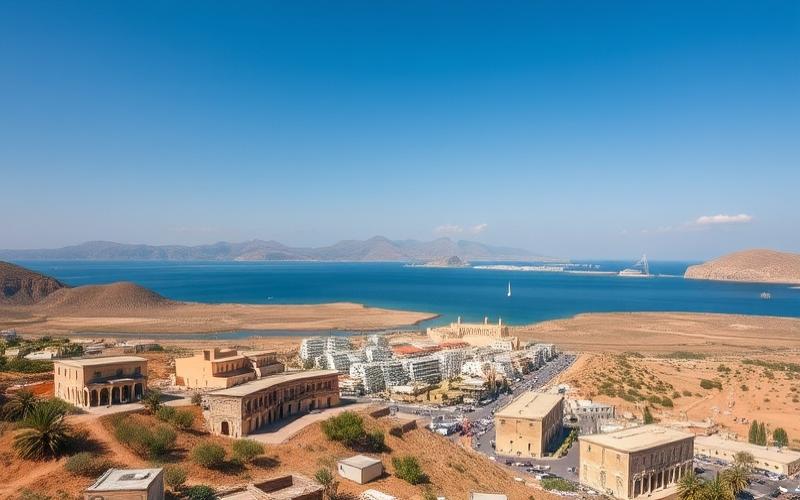
 Published on and written by Cyril Jarnias
Published on and written by Cyril Jarnias
Dreaming of settling on the sunny island of Cyprus? With its pristine sandy beaches, rich historical heritage, and enviable quality of life, Cyprus attracts many expatriates every year. However, as with any relocation, moving to Cyprus requires thorough preparation and knowledge of the necessary administrative procedures. In this article, we guide you step by step to ensure your successful settlement on the Island of Aphrodite.
Opening the Doors to Cyprus: Obtaining the Precious Pass
The first step to living in Cyprus is obtaining the right visa or residence permit. The formalities differ depending on your nationality and the intended duration of your stay.
For European Union citizens: If you are a national of an EU member country, you benefit from free movement and do not need a visa to enter Cyprus. You can stay freely for up to 3 months in Cypriot territory. Beyond that, you must apply for a registration certificate, commonly known as the “Yellow Slip.”
- Valid passport or identity card
- Proof of address in Cyprus
- Proof of sufficient resources (employment contract, bank statements, etc.)
- Health insurance valid in Cyprus
- Passport photos
- Duly completed MEU1 form
The Yellow Slip will be issued for a period of 5 years, renewable. It will allow you to work and reside legally in Cyprus.
- Work visa: if you have a job offer in Cyprus
- Student visa: for pursuing higher education on the island
- Retiree visa: if you wish to spend your retirement in Cyprus
- Investor visa: if you plan to invest in Cypriot real estate or a business
The visa application is made at the Cypriot embassy or consulate in your home country. Processing times can take several weeks, or even months. Therefore, it is recommended to start your procedures early.
Once on site, you will need to convert your visa into a temporary residence permit through the immigration department. This permit is typically valid for 1 to 2 years and is renewable.
Good to know:
Nationals of certain countries like the United States, Canada, or Australia can enter Cyprus without a visa for a tourist stay of up to 90 days. Beyond that, they must apply for a residence permit.
Finding Your Cozy Nest: The Quest for the Ideal Home
Once you have your visa or residence permit in hand, the next step is to find housing. The Cypriot real estate market offers many opportunities, whether for purchase or rent.
- Nicosia (the capital): between €500 and €1000 for a 2-bedroom apartment
- Limassol: from €600 to €1200 for a similar accommodation
- Paphos: more affordable rents, around €400 to €800
- Local real estate agencies (beware of agency fees)
- Specialized websites like Bazaraki or Cyprus Property News
- Facebook groups for expatriates in Cyprus
Real estate purchase: a long-term investment If you plan to settle in Cyprus long-term, purchasing property can be an attractive option. Real estate prices remain competitive compared to other Mediterranean destinations, with an average price per square meter ranging between €1500 and €3000 depending on the region.
- Hire a local specialized lawyer to secure your transaction
- Carefully verify property titles
- Be cautious with properties located in the northern part of the island (not internationally recognized)
Purchasing property valued over €300,000 can make you eligible for a permanent residence permit, an attractive option for many foreign investors.
Good to know:
In Cyprus, most rental contracts are concluded for a duration of one year, renewable. A security deposit equivalent to 1 or 2 months’ rent is usually required.
Renewing Your Right of Residence: Plan Ahead to Avoid Hassles
Whether you are an EU citizen or a third-country national, it is crucial to renew your residence permit before it expires to continue residing legally in Cyprus.
- Valid passport or identity card
- Original Yellow Slip
- Recent proof of address
- Proof of sufficient resources
- Up-to-date health insurance
- Recent passport photos
If you have resided in Cyprus continuously for more than 5 years, you can apply for a permanent residence permit, valid indefinitely.
- Valid passport
- Current residence permit
- Proof of address
- Proof of sufficient resources
- Health insurance
- Clean criminal record certificate
- Passport photos
Renewal can take several weeks. Therefore, it is essential to plan this step in advance to avoid any irregular stay.
Toward permanent residence: After 5 years of legal and continuous residence in Cyprus, non-EU nationals can apply for a permanent residence permit. This process offers greater security and stability for your life in Cyprus.
Good to know:
Failure to renew your residence permit on time can result in fines, or even an obligation to leave the territory. Be vigilant and plan your procedures ahead!
Integrating into Cypriot Society: Essential Procedures
Living in Cyprus involves integrating into the local administrative system. Here are the main procedures to complete for a proper settlement:
1. Register with local authorities Within 8 days of your arrival, you must register with the police station in your place of residence. This step is mandatory, even for EU citizens.
2. Obtain a tax identification number To work or open a bank account in Cyprus, you will need a tax identification number. Go to the tax office in your district with your passport and residence permit to obtain it.
3. Enroll in social security Cyprus has a social security system called GESY (General Healthcare System). Enrollment is mandatory for all residents, including expatriates. It will give you access to public healthcare.
4. Open a bank account Although not mandatory, opening a local bank account will greatly facilitate your daily life in Cyprus. The main banks are Bank of Cyprus, Hellenic Bank, and Alpha Bank. You will need your passport, residence permit, and proof of address.
5. Exchange your driver’s license If you hold a European driver’s license, it remains valid in Cyprus. Holders of non-European licenses must exchange it for a Cypriot license within 6 months of their arrival.
6. Enroll your children in school Education is mandatory for all children aged 5 to 15 in Cyprus. You must enroll your children in a public (free) or private school in your district of residence.
Good to know:
Proficiency in Greek is not mandatory to complete these procedures, as English is widely spoken in Cypriot administration. However, learning some basic Greek will greatly facilitate your daily integration.
Knowing Your Rights and Duties: The Legal Framework for Expatriates
Settling in Cyprus requires compliance with local laws and regulations. Here is an overview of the main points to know:
- The average work week is 38 hours
- The minimum wage is set at approximately €940 per month (in 2025)
- Paid leave is a minimum of 20 days per year
- A work permit is required for non-EU nationals
- Income tax is progressive, with rates ranging from 0% to 35%
- The first €19,500 of annual income is tax-exempt
- Foreign retirees benefit from a favorable tax regime
- Income generated abroad is subject to specific rules
- Limit of one property per foreign individual or couple
- Maximum land area of 4,014 m²
- Council of Ministers approval required for certain purchases
- Proving sufficient resources to support the family
- Having adequate housing
- Having resided in Cyprus for at least one year (for non-EU nationals)
- Proficiency in the Greek language
- Knowledge of Cypriot history and culture
- Clean criminal record
- Integration into Cypriot society
Good to know:
Cyprus allows dual citizenship, so you will not have to renounce your original nationality to become Cypriot.
Settling in Cyprus offers many advantages: quality of life, pleasant climate, attractive taxation. However, as with any relocation, it requires good preparation and adherence to administrative procedures. By following this guide and regularly checking with the competent authorities, you will maximize your chances of success in your new life on the Island of Aphrodite.
Disclaimer: The information provided on this website is for informational purposes only and does not constitute financial, legal, or professional advice. We encourage you to consult qualified experts before making any investment, real estate, or expatriation decisions. Although we strive to maintain up-to-date and accurate information, we do not guarantee the completeness, accuracy, or timeliness of the proposed content. As investment and expatriation involve risks, we disclaim any liability for potential losses or damages arising from the use of this site. Your use of this site confirms your acceptance of these terms and your understanding of the associated risks.



























